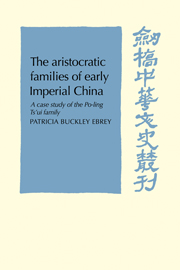Book contents
- Frontmatter
- Contents
- List of tables
- Acknowledgements
- Chronology of the Chinese dynasties
- 1 Introduction
- 2 The historical development of the aristocratic families
- 3 Origins of the Ts'uis in the Han
- 4 The Ts'uis in the aristocratic age
- 5 The Ts'uis as an old family in the T'ang
- 6 Implications and conclusions
- Notes to the text
- Appendix I The reliability of the genealogical tables in the Hsin T'ang shu
- Appendix II Annotated genealogy of the descendants of Ts'ui Yen, d. 646
- Appendix III Marriages of Po-ling Ts'uis during the T'ang
- Bibliography
- Glossary
- Index
5 - The Ts'uis as an old family in the T'ang
Published online by Cambridge University Press: 04 August 2010
- Frontmatter
- Contents
- List of tables
- Acknowledgements
- Chronology of the Chinese dynasties
- 1 Introduction
- 2 The historical development of the aristocratic families
- 3 Origins of the Ts'uis in the Han
- 4 The Ts'uis in the aristocratic age
- 5 The Ts'uis as an old family in the T'ang
- 6 Implications and conclusions
- Notes to the text
- Appendix I The reliability of the genealogical tables in the Hsin T'ang shu
- Appendix II Annotated genealogy of the descendants of Ts'ui Yen, d. 646
- Appendix III Marriages of Po-ling Ts'uis during the T'ang
- Bibliography
- Glossary
- Index
Summary
In the Sui the Ts'uis' position seemed precarious, their reactions at times defensive. In the early T'ang, however, they regained a secure hold on eminence. The hundreds, perhaps thousands, of men who called themselves Poling Ts'uis in the T'ang no longer formed a great provincial family. Provincial affairs were left to other families while the Ts'uis sought national honors. As members of an ‘old family’ with an envied pedigree, Ts'ui men gained official posts and their daughters and sisters were in demand as brides. The Ts'uis boasted of no special privileges, demanded no deference to their pedigree or blood. They acted in public at least as though they were the same as other members of the upper class. The Ts'uis married only among families of like status, but otherwise did not hold themselves aloof from prominent politicians or literati of non-aristocratic background.
As discussed in the previous chapter, the Ts'uis strong local base and privileged access to office had both been lost in the Sui. Although the Ts'uis retained the prestige of their pedigree and of their civil and cultural traditions into the early T'ang, prestige alone was hardly adequate to preserve the old families' status for centuries. T'ang China, however, is not the only place where an aristocracy survived after its original sources of power and status had disappeared. Old elites, with their resources of wealth and influence, have often been able to develop the qualities needed in the new era.
- Type
- Chapter
- Information
- The Aristocratic Families in Early Imperial ChinaA Case Study of the Po-Ling Ts'ui Family, pp. 87 - 115Publisher: Cambridge University PressPrint publication year: 1978



